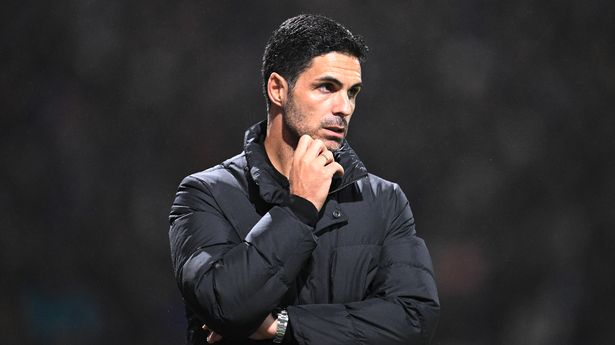Mikel Arteta’s journey as Arsenal’s manager has been marked by significant progress, but as the club continues to pursue its first major trophy in five years, questions about his identity and approach are becoming increasingly urgent. Despite a commendable performance in the previous season, where Arsenal narrowly missed the Premier League title, the current campaign has raised concerns about the team’s direction under Arteta.
A Quest for Identity
Arteta has often echoed sentiments of determination and ambition, emphasizing the need for his team to push boundaries to compete with Manchester City. After finishing just two points behind City last season, he stated, “If we do what we have to do, we’re going to be closer… in the end, we’ll win it.” However, the reality is that Arsenal’s trajectory appears to be stalling.
The Gunners have started this season poorly, finding themselves seven points behind Liverpool and five behind City after just ten games. With each passing match, the dream of dethroning City seems to fade further away. Arteta’s insistence that the team is “on the right path” feels increasingly hollow if tangible success does not materialize soon.
Creativity Issues
Recent performances have highlighted a troubling lack of creativity within the squad. The defeat to Newcastle, where Arsenal failed to convert possession into meaningful chances, exemplified this issue. Arteta admitted the team “didn’t defend the box well enough,” but also noted their inability to adapt to the game situation. With players like Martin Ødegaard missing, the Gunners have struggled to find a rhythm, relying too heavily on a few key players like Kai Havertz and Bukayo Saka.
Critics argue that Arteta’s overly pragmatic tactics have stifled the team’s attacking potential, leading to a more cautious style of play reminiscent of José Mourinho’s defensive approach. Jamie Carragher noted this shift, pointing out Arteta’s tendency to retreat and protect leads rather than push for more goals.
Tactical Shifts and Concerns
Arteta’s shift from an expansive, attacking style to a more conservative approach has raised eyebrows. The focus on set-piece opportunities rather than open play has resulted in dropped points against key rivals. Arsenal’s failure to convert early leads into wins has highlighted a lack of confidence and a clear plan B when things go wrong.
With a squad that lacks depth, particularly in creative areas, Arteta’s decisions during the transfer window are under scrutiny. Selling Emile Smith Rowe and loaning Fabio Vieira left Arsenal short on creative options, and the failure to secure a prolific striker has compounded the issue.
Navigating Challenges
As the season progresses, Arsenal faces a critical stretch of matches that could define their campaign. Upcoming fixtures against Inter Milan, Chelsea, Nottingham Forest, Sporting CP, and West Ham present significant challenges. Each game is an opportunity for Arteta to demonstrate whether he can adapt and inspire his team to rediscover their attacking prowess.
If Arsenal continues to struggle, questions about Arteta’s future will inevitably arise. Has he maximized the potential of this squad, or is it time for a change? The narrative surrounding his tenure will depend largely on the performances and results in the coming weeks.
Conclusion
Mikel Arteta’s challenge is clear: he must carve out his own identity as a manager while ensuring Arsenal evolves into a team capable of competing for trophies. The current trajectory suggests that without a shift in approach and a rekindling of attacking creativity, Arsenal risks falling further behind their rivals. The coming weeks will be crucial in determining whether Arteta can navigate these challenges and lead the Gunners back to glory.
